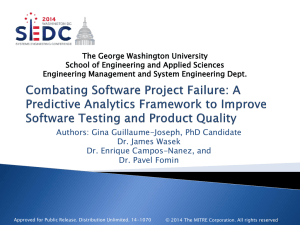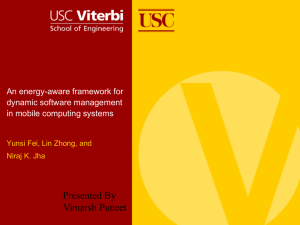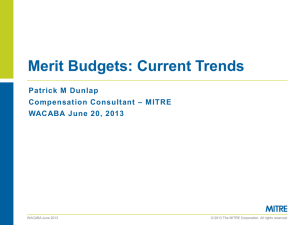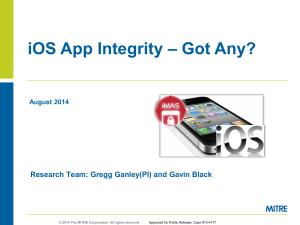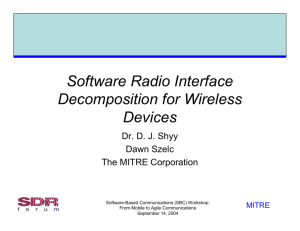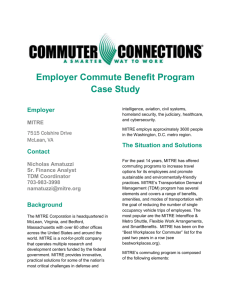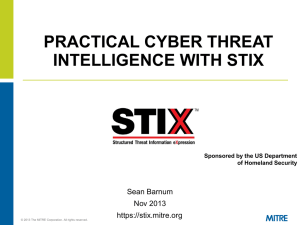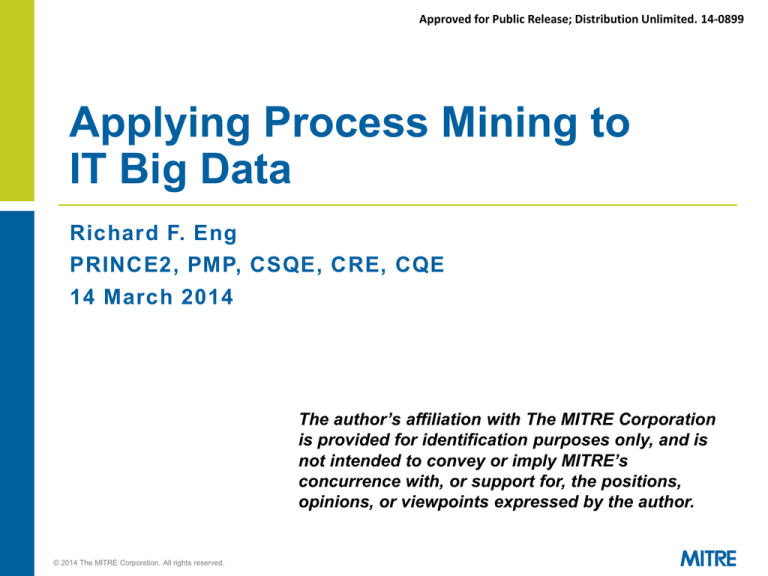
Approved for Public Release; Distribution Unlimited. 14-0899
Applying Process Mining to
IT Big Data
Richard F. Eng
PRINCE2, PMP, CSQE, CRE, CQE
14 March 2014
The author’s affiliation with The MITRE Corporation
is provided for identification purposes only, and is
not intended to convey or imply MITRE’s
concurrence with, or support for, the positions,
opinions, or viewpoints expressed by the author.
© 2014 The MITRE Corporation. All rights reserved.
|2|
Agenda
Biography
Big Data Definitions
Process Mining
Quantitative Analysis Stages and Steps
Applying Process Mining
Lessons Learned
© 2014 The MITRE Corporation. All rights reserved.
|3|
Biography
Principal Software Systems Engineer at the MITRE
Corporation
Over 20 years of industry experience in telecommunications
and software systems
Areas of interests
– Solving systems level problems
– Applying quantitative methods to improve business , IT
processes, and software quality
Education:
– M.S. in Data Analytics, University of Maryland (Expected 2015)
– MBA, Georgetown University
– M.S. in Bioengineering, Brooklyn Polytechnic Institute
– B.S. in Chemistry, Brooklyn Polytechnic Institute
© 2014 The MITRE Corporation. All rights reserved.
|4|
Big Data Definitions
Big data is data which “exceed(s) the capacity or capability of
current or conventional methods and systems.” In other words,
the notion of “big” is relative to the current standard of
computation.
The National Institute of Standards and Technology
“… the increasing size of data, the increasing rate at which it is
produced and the increasing range of formats and
representations employed. This report predated the term “big
data” but proposed a three-fold definition encompassing the
“three Vs”: Volume, Velocity and Variety. This idea has since
become popular and sometimes includes a fourth V: Veracity, to
cover questions of trust and uncertainty.”
Gartner. In 2001, a Meta (now Gartner) report
© 2014 The MITRE Corporation. All rights reserved.
|5|
Big Data Definitions (continued)
“Big data is the term increasingly used to describe the process of
applying serious computing power—the latest in machine learning
and artificial intelligence — to seriously massive and often highly
complex sets of information.”
Microsoft
“Big data opportunities emerge in organizations generating a
median of 300 terabytes of data a week. The most common forms of
data analyzed in this way are business transactions stored in
relational databases, followed by documents, e-mail, sensor data,
blogs, and social media.
Intel
The Method for an Integrated Knowledge Environment open-source
project. The MIKE project argues that big data is not a function of the
size of a data set but its complexity. Consequently, it is the high
degree of permutations and interactions within a data set that
defines big data.
© 2014 The MITRE Corporation. All rights reserved.
|6|
Process Mining
Data analytics technique
System agnostic
Examines large amounts of process data
Provides the ability to
– Evaluate and understand actual process flows
– Compare actual against expected process flows from a
Policy, procedures, and/or Information Technology perspective
Impact of visualizing actual process flows
– Detection of process patterns
– Identification of process inefficiencies
– Identification of anomalous behavior
© 2014 The MITRE Corporation. All rights reserved.
|7|
Quantitative Analysis 3 Stages and 6 Steps
Frame the Problem
• Problem
recognition
• Review previous
results
Solving the Problem
Communicating and
Acting On Results
• Modeling and
variable selection
• Data collection
• Data analysis
• Results
presentation and
action
Source: Keeping up with the Quants: Your Guide
to Understanding and Using Analytics –
Davenport, T. and Kim, J. (2013).
© 2014 The MITRE Corporation. All rights reserved.
|8|
Frame the Problem
Problem recognition
– Figure out where the problems are with the SYSTEM & fix them fast
– E-Commerce site experiencing significant operational availability
issues
Site performance degrades and crashes as more customers access services
No current documentation (e.g., Systems requirements, design specifications,
applications software, test procedures, test scripts, etc.)
– We were Agile. We didn’t have time to …
Review of previous results
– Ad hoc problem solving huddles
It’s not my system. It must be your …
Try this, it should/might fix it …
– No tracing of business processes to software applications to IT
infrastructure
– Manual review of system logs
“Furious activity is no substitute for understanding.”
- H. H. Williams
© 2014 The MITRE Corporation. All rights reserved.
|9|
Solving the Problem
Modeling and variable selection
– Apply process mining to model end user transactions through the Ecommerce site
– Variables needed
Unique Transaction ID, Start and Stop Time Stamp, and Activity
Data collection
– Gain access to system log files
Normal operations
During outages and low operational availability
Data analysis
– Run process model
– Review results
– Provide feedback to stakeholders that own the processes,
application software, and IT infrastructure
© 2014 The MITRE Corporation. All rights reserved.
| 10 |
Communicating and Acting on Results
Results presentation and action
– Demonstrate process mining results to stakeholders
– Capture process mining visualization as a video and e-mail to
stakeholders so they can see the process bottlenecks and
deviations
– Explain the findings
© 2014 The MITRE Corporation. All rights reserved.
| 11 |
Applying Process Mining to IT Big Data
Modeling and variable selection
– Process mining
Visualize normal and anomalous operations
– Transaction process flows
– Application process flows
– IT Infrastructure process flows
– Variables needed
Unique Transaction ID
Start and End Time Stamps
Business Process
Application Software
IT Infrastructure
IP Address
© 2014 The MITRE Corporation. All rights reserved.
| 12 |
Applying Process Mining to IT Big Data
(Continued)
Data collection
– Talk with system administrators to capture log data
– Explain the data fields and formats you want
– Transform the log files into the format that the process mining
system needs
Data analysis
– Load the data into the process mining model
– Run the process mining models
Data Collection
– Visualize and analyze data
Transaction business process flows
Transform Data
Application software process flows
IT infrastructure process flows
Run the Model &
– Review the results
Data Analysis
© 2014 The MITRE Corporation. All rights reserved.
| 13 |
Applying Process Mining to IT Big Data
(Continued)
Communicate results
– Provide feedback to stakeholders
Process owners
Application software team
IT Infrastructure team
Benefits
– Visualization of the actual process flows
– Comparison of normal and anomalous operations - rather than
manually reviewing individual system logs
– More rapidly identify spurious processes
© 2014 The MITRE Corporation. All rights reserved.
| 14 |
Illustration of Process Mining Data
User ID
m1000000
m1000000
m1000000
m1000000
m1000000
m1000000
m1000000
m1000000
m1000000
m1000001
m1000002
m1000002
m1000002
m1000002
m1000002
m1000002
m1000002
m1000002
m1000002
m1000002
Start Time Stamp
End Time Stamp
10/15/2013 12:03 10/15/2013 12:04
10/15/2013 12:04 10/15/2013 12:05
10/15/2013 12:05 10/15/2013 12:07
10/15/2013 12:07 10/15/2013 12:08
10/15/2013 12:08 10/15/2013 12:10
10/15/2013 12:10 10/15/2013 12:12
10/15/2013 12:12 10/15/2013 12:13
10/15/2013 12:13 10/15/2013 12:15
10/15/2013 12:15 10/15/2013 12:18
10/15/2013 12:18 10/15/2013 12:22
10/15/2013 12:04 10/15/2013 12:05
10/15/2013 12:05 10/15/2013 12:07
10/15/2013 12:07 10/15/2013 12:08
10/15/2013 12:08 10/15/2013 12:10
10/15/2013 12:10 10/15/2013 12:12
10/15/2013 12:12 10/15/2013 12:13
10/15/2013 12:13 10/15/2013 12:15
10/15/2013 12:15 10/15/2013 12:18
10/15/2013 12:18 10/15/2013 12:22
10/15/2013 12:22 10/15/2013 12:23
© 2014 The MITRE Corporation. All rights reserved.
Business Process Step
Registration
Enrollment
Demographic Information
Customer Verification
Review Service Options
Select Service
Purchase Service
Make Payment
Payment Confirmation
Exit
Registration
Enrollment
Demographic Information
Customer Verification
Review Service Options
Select Service
Purchase Service
Make Payment
Payment Confirmation
Exit
Application Software
REG APP
ENROLL APP
CUSTOMER INFO APP
CUST VERIFICATION APP
SERVICE MENU APP
SERVICE SELECTION APP
PURCHASE APP
PAYMENT APP
CONFIRM PAYMENT APP
EXIT APP
REG APP
ENROLL APP
CUSTOMER INFO APP
CUST VERIFICATION APP
SERVICE MENU APP
SERVICE SELECTION APP
PURCHASE APP
PAYMENT APP
CONFIRM PAYMENT APP
EXIT APP
Infrastructure
Server 1
Server 1
Server 2
DB 1
Server 3
Server 4
Server 4
Server 5
DB 2
Server 5
Server 1
Server 1
Server 2
DB 1
Server 3
Server 4
Server 4
Server 5
DB 2
Server 5
IP Address
255.130.155.33
255.130.155.34
255.130.155.35
255.130.155.36
255.130.155.37
255.130.155.38
255.130.155.39
255.130.155.40
255.130.155.41
255.130.155.42
255.130.155.33
255.130.155.34
255.130.155.35
255.130.155.36
255.130.155.37
255.130.155.38
255.130.155.39
255.130.155.40
255.130.155.41
255.130.155.42
| 15 |
Process Mining Demo (Using DUMMY DATA)
Transaction Business Process Flow
Application Software Process Flow
IT Infrastructure and IP Address Process Flow
© 2014 The MITRE Corporation. All rights reserved.
| 16 |
Lessons Learned
Good news
– Process mining concept works
Bad news
– Not all of the IT infrastructure was instrumented to collect log data
– In some cases the log data was aggregate rather than per
transaction
– Some logs lacked unique transaction IDs
– System time was not synchronized across the IT infrastructure
– IaaS provider never contracted to provide system log data
Parting thoughts
– Make sure the network and system time for all of your infrastructure
are synchronized
– Require all XaaS providers to provide system log data
– Plan for process mining at the start of the project
© 2014 The MITRE Corporation. All rights reserved.
| 17 |
Should You Consider Process Mining?
“The most difficult subjects can be explained to the most slowwitted man if he has not formed any idea of them already; but
the simplest thing cannot be made clear to the most intelligent
man if he is firmly persuaded that he knows already, without a
shadow of doubt, what is laid before him.” – Leo Tolstoy
© 2014 The MITRE Corporation. All rights reserved.
| 18 |
Contact Information
Richard F. Eng
reng@mitre.org
reng@student.umuc.edu
703-201-9112
© 2014 The MITRE Corporation. All rights reserved.

